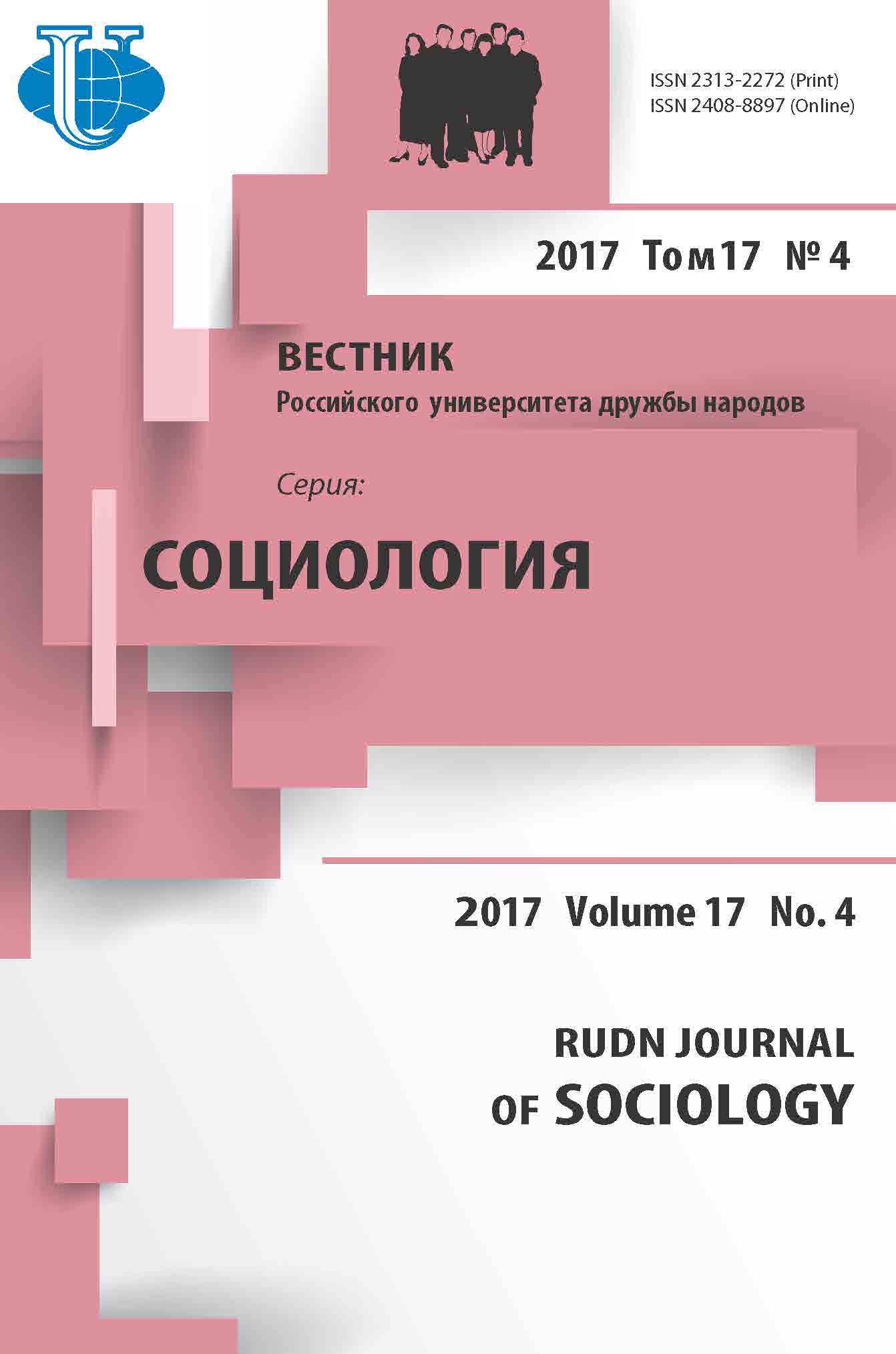MODELS OF STATE REFORMS IN AGRICULTURE: PAST AND PRESENT
- Authors: Kiselev AG1, Shilina SA2
-
Affiliations:
- Editorial Board of Presidential Control
- Bryansk State University named after academician I.G. Petrovsky
- Issue: Vol 17, No 4 (2017)
- Pages: 481-490
- Section: Contemporary society: the urgent issues and prospects for development
- URL: https://journals.rudn.ru/sociology/article/view/17290
- DOI: https://doi.org/10.22363/2313-2272-2017-17-4-481-490
- ID: 17290
Cite item
Full Text
Abstract
The article outlines social and economic consequences of collectivization to compare this state policy with the changes in agriculture in the 1990s, and to estimate chances of the Russian agriculture to overcome the current crisis. The article is based on archive data on collectivization and on the program developed by the Academy of High Ecotechnologies. The authors believe that at the time of collectivization, it was a way to optimize agriculture: largely due to collectivization, though with all its losses and ‘extremes’, the soviet agriculture was partially industrialized and provided the country with food in the hardest years of the Great Patriotic War and in the post-war period, thus ensuring the food security of the Soviet state. The ‘emergency’ model of the so-called ‘return to civilization’ that was adopted under the reforms of the 1990s aimed at turning the collective farmer into an individual farmer or a rural wageworker, but such a social ‘migration’ strategy imposed ‘from above’ deformed the rural social stratum and determined serious economic problems. Today the authors consider the neo-collective farms as a promising perspec-tive. They also support the program developed by the Academy of High Ecotechnologies for intensification of agricultural production on the basis of progressive domestic and foreign technologies, which will allow to increase the agricultural production in the next three to five years by several times. In particular, for more effective use of agricultural technologies and processing industries, the program suggests develop-ing the enlarged organizational-economic structures - ‘agropromkhozes’.
About the authors
A G Kiselev
Editorial Board of Presidential Control
Author for correspondence.
Email: alexandr.profession@yandex.ru
Malaya Nikitskaya St., 19-1, Moscow, 121069, Russia
S A Shilina
Bryansk State University named after academician I.G. Petrovsky
Email: supershili2012@yandex.ru
Bezhitskaya St., 14, Bryansk, 241036, Russia
References
- Ivanov V.N. Chastnaya sobstvennost v obschestvennom mnenii rossiyan (po materialam issledovaniya) [Private property in the public opinion of Russians (based on the survey results)]. RUDN Journal of Sociology. 2008; 3 (In Russ.).
- Kiselev A.G. Avtoritet i sila vlasti [Authority and power]. Menedzhment v Rossii i za rubezhom. 2000; 2 (In Russ.).
- Kiselev A.G. Regionalnaya upravlencheskaya informatsiya v gosudarstvennom upravlenii: sotsiologicheskiy analiz, opyit, problemyi [Regional Management Information in Public Administration: Sociological Analysis, Experience, Problems]. Moscow; 2003 (In Russ.).
- Kiselev A.G., Kirichek P.N. Informatsiya v perimetre upravleniya: algoritmyi rekonstruktsii [Information in management: Reconstruction algorithms]. Sotsiologicheskaya nauka i sotsialnaya praktika. 2016; 1 (In Russ.).
- Kiselev A.G., Shilina S.A. Upravlencheskiy diskurs kak sotsialnaya kommunikativnaya tehnologiya v sisteme otnosheniy gosudarstva i sotsiuma [Management Discourse as a Social-Communicative Technology in the System of State-Society Relations]. Moscow; 2017 (In Russ.).
- Klyuchnikova T.N. Kanalyi sotsialnogo vzaimodeystviya gosudarstva i obschestva [Channels of State-Society Social Interaction]. RUDN Journal of Sociology. 2010; 3 (In Russ.).
- Komov N.V. Rossiyskaya model zemlepolzovaniya i zemleustroystva [Russian Model of Land Use and Land Management]. Moscow; 2001 (In Russ.).
- Kontseptsiya plana vozrozhdeniya rossiyskogo sela [The concept-plan for the revival of the Russian village]. http://www.kpe.ru/video-foto-materialy/seminary-po-kob-vystupleniya/1292vozrojdenye-rossyiskogo-sela (In Russ.).
- Kurakin A.A. Neklassicheskie selskohozyaystvennyie kooperativyi Belgorodskoy oblasti: kak vlast uchrezhdaet kooperatsiyu [Nonclassic agricultural cooperatives in the Belgorod Region: How local authorities establish cooperation]. RUDN Journal of Sociology. 2012; 4 (In Russ.).
- Natsionalnaya ideya Rossii [Russian National Idea]. 6 vol. Vol. I. Moscow; 2012 (In Russ.).
- Nikulin A.M. Ot postkolhoza k oligarhozu [From postkolkhoz to oligarkhoz]. RUDN Journal of Sociology. 2011; 2 (In Russ.).
- Nikulin A.M., Trotsuk I.V. Selskoe razvitie Finljandii: vzaimodejstvie gosudarstva, fermerov i nauki (vozmozhnye uroki dlja Rossii) [Rural development of Finland: interaction of the state, farmers and science (possible lessons for Russia)]. Mir Rossii. 2014; 3 (In Russ.).
- Putin V.V. O povyishenii effektivnosti upravleniya zemelnyimi resursami v interesah grazhdan i yuridicheskih lits [On increasing the effectiveness of land management in the interests of citizens and legal entities]. https://professionali.ru/Soobschestva/futurpolis/v-putin-o-povysheniieffektivnosti-92674548 (In Russ.).
- SSSR v 1928—1941 gg. [USSR in 1928—1941]. http://studopedia.su/2_8486_sssr-v-gg.html (In Russ.).
- Stalin I.V. Rech na pervom Vsesoyuznom s'ezde kolhoznikov-udarnikov [Speech at the First All-Union Congress of Collective Farmers-Record-Setters]. Sochineniya. 16 vols. Vol. 13. http://www.hrono.ru/libris/stalin/13-44.html (In Russ.).
- Chayanov A.V. Krestyanskoe hozyaystvo. Izbrannyie trudy [Peasant Economy. Selected Works]. Moscow; 1989 (In Russ.).
- Chayanov A.V. Organizatsiya krestyanskogo hozyaystva [Organization of peasant economy]. Izbrannyie trudy. Moscow; 1991 (In Russ.).
Supplementary files













